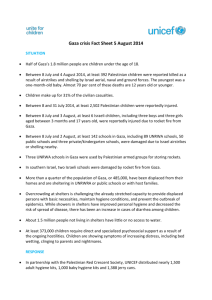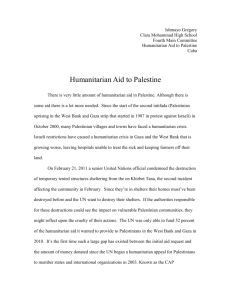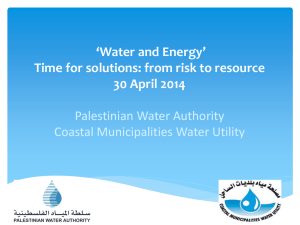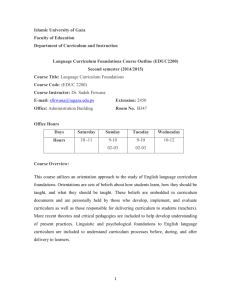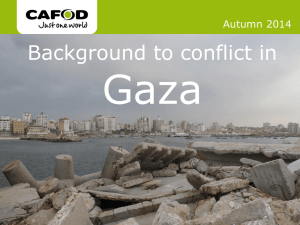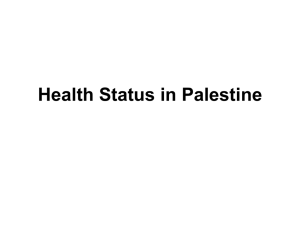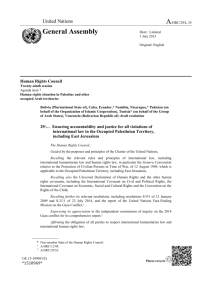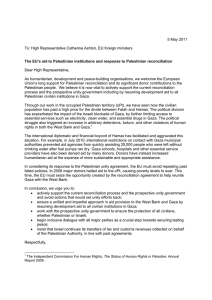Read the Humanitarian needs & UNICEF response in Gaza
advertisement
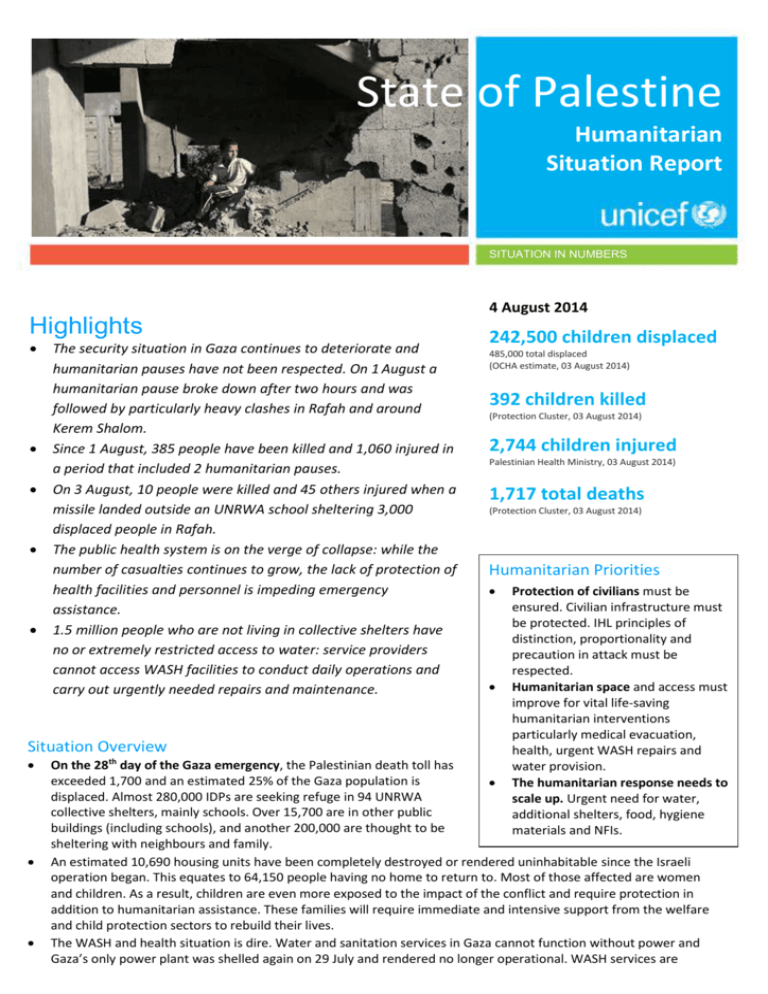
State of Palestine Humanitarian Situation Report SITUATION IN NUMBERS 4 August 2014 Highlights The security situation in Gaza continues to deteriorate and humanitarian pauses have not been respected. On 1 August a humanitarian pause broke down after two hours and was followed by particularly heavy clashes in Rafah and around Kerem Shalom. Since 1 August, 385 people have been killed and 1,060 injured in a period that included 2 humanitarian pauses. On 3 August, 10 people were killed and 45 others injured when a missile landed outside an UNRWA school sheltering 3,000 displaced people in Rafah. The public health system is on the verge of collapse: while the number of casualties continues to grow, the lack of protection of health facilities and personnel is impeding emergency assistance. 1.5 million people who are not living in collective shelters have no or extremely restricted access to water: service providers cannot access WASH facilities to conduct daily operations and carry out urgently needed repairs and maintenance. Situation Overview 242,500 children displaced 485,000 total displaced (OCHA estimate, 03 August 2014) 392 children killed (Protection Cluster, 03 August 2014) 2,744 children injured Palestinian Health Ministry, 03 August 2014) 1,717 total deaths (Protection Cluster, 03 August 2014) Humanitarian Priorities Protection of civilians must be ensured. Civilian infrastructure must be protected. IHL principles of distinction, proportionality and precaution in attack must be respected. Humanitarian space and access must improve for vital life-saving humanitarian interventions particularly medical evacuation, health, urgent WASH repairs and water provision. The humanitarian response needs to scale up. Urgent need for water, additional shelters, food, hygiene materials and NFIs. On the 28th day of the Gaza emergency, the Palestinian death toll has exceeded 1,700 and an estimated 25% of the Gaza population is displaced. Almost 280,000 IDPs are seeking refuge in 94 UNRWA collective shelters, mainly schools. Over 15,700 are in other public buildings (including schools), and another 200,000 are thought to be sheltering with neighbours and family. An estimated 10,690 housing units have been completely destroyed or rendered uninhabitable since the Israeli operation began. This equates to 64,150 people having no home to return to. Most of those affected are women and children. As a result, children are even more exposed to the impact of the conflict and require protection in addition to humanitarian assistance. These families will require immediate and intensive support from the welfare and child protection sectors to rebuild their lives. The WASH and health situation is dire. Water and sanitation services in Gaza cannot function without power and Gaza’s only power plant was shelled again on 29 July and rendered no longer operational. WASH services are currently operating at 20% capacity. The number of diarrhea cases is increasing due to a lack of water for both drinking and personal hygiene. At least 373,000 children already require direct and specialised psychosocial support, calculated on the basis of families who have experienced death, injury or loss of home over the past 25 days. Children are showing increasing symptoms of distress including fearfulness, bed wetting, clinging to parents and nightmares. Clashes between Palestinians and Israeli Security forces are increasing every day in the West Bank and East Jerusalem. Summary Analysis of Programme response UNICEF’s emergency response in Gaza is focusing on supporting conflict-affected populations inside collective shelters and in host communities. In East Jerusalem and the West Bank, UNICEF’s support will expand with a focus on families affected by recent violence and hostilities. WASH In partnership with the Palestinian Red Crescent Society, UNICEF distributed 1,478 adult hygiene kits, 998 baby hygiene kits and 1,388 jerry cans. Procurement of additional supplies for future distributions is on-going. UNICEF is facilitating the work of the Coastal Municipal Water Utility (CMWU) with coordination, repairs to water tankers and $100,000 for critical repairs to infrastructure across Gaza. Due to on-going fighting and lack of humanitarian access, only limited repairs could be carried out; six municipal water workers have been killed. Three UNICEF communal water points (bladders) have been installed and 10 more are awaiting approval by Israeli authorities for import into Gaza. Vouchers for water, hygiene products and food were distributed to 2,300 vulnerable families whose homes have been destroyed through a joint WFP-UNICEF programme, building on WFP’s existing food voucher system. The aim is to support up to 10,000 families. Health & Nutrition UNICEF provided essential vaccines to continue routine immunization. Vaccinations are now underway in Primary Health Centres run by the Ministry of Health and UNRWA. Essential drugs for children and medical consumables will arrive in the coming days. Coordination with and technical advice to UNRWA and WFP on provision of food to displaced children aged 6 months to 2 years is on-going in collective shelters. Efforts are underway with WHO, MOH and UNRWA to promote awareness raising on breastfeeding and need to minimize risks of communicable diseases. Child Protection UNICEF is supporting partners to verify all child fatalities. Daily reports are produced on killings, injuries and other grave violation against children. Emergency psychosocial teams (PCDCR) supported by UNICEF have provided initial psychosocial support to 3,070 children across the Gaza Strip. Other partners have also been conducting psychosocial activities in communal shelters. 42 staff and volunteers working in the government collective shelters have received a 3 hour briefing on core child protection principles to assist with their management of the shelters. The formation of child/adolescent friendly areas in shelters is also in process. Last week, radio spots were aired on radio stations to alert children and their families on the dangers posed by UXOs (up to 1 million people in Gaza were reached). However, since the bombing of the power station and the lack of electricity available in Gaza, this form of messaging no longer effective. UNICEF will ensure that all protection partners working in the collective shelters deliver messaging verbally. Since 20 July, child protection and psychosocial text messages were sent to 200,000 subscribers of Jawwal in Gaza. The messages include actions that caregiver should take to reduce the vulnerability of children to death and injury, to reduce psychosocial distress and to prevent and respond to child abuse. UNICEF and Jawwal provided a free phone number to call for advice and support (Sawa Helpline 121). However, due to the current lack of electricity in Gaza, this messaging will now be integrated into the activities of other partners rather than relying on the mobile phone network. Since 13 July, Sawa Child Protection Helpline had operated 24/7 with increased capacity to take 30 calls at one time. Since 8 July 2014, Sawa had been able to provide counselling to 1,277 callers from Gaza, including 377 from children. Humanitarian leadership and coordination Emergency Operations Centres (EOC) have been established in Gaza and Ramallah. The Gaza EOC meets every other day to focus on the emergency response including monitoring visits to collective shelter and conflict affected communities. The EOC also acts as an advocacy platform to raise challenges related to humanitarian access. The EOC Secretariat in Ramallah supports Gaza to provide a coordinated approach to appeals by different Ministries. A more limited coordination group focuses only on IDP needs, in which UNICEF also participates. UNICEF leads the Child Protection Working Group and affiliated groups for mental health and psychosocial (MHPSS), and for monitoring and reporting of grave violations against children (MRM). These groups have been merged to maximise coordination of child protection responses during the emergency. UNICEF continues to lead the WASH cluster and co-lead the Education cluster with Save the Children, both in Gaza and at the national level, with dedicated staff capacity Security The security situation in Gaza remains critical. Humanitarian pauses have not been respected, with extremely heavy clashes in Rafah and around Kerem Shalom over the reporting period with 150 killed in Rafah alone in 1 day. Israeli forces pulled out from Beit Lahiya and announced that population can return, and there are reports of an IDF pull-out from East Khan Younes (Khuza’a). However, the troops remain inside all areas starting from Beit Hanoun, east Jabaliya and east Shajaiya and shelling in Rafah and Shajaiya continues. In the past 24 hours air forces have been active in all areas of Gaza causing injuries and death, situation is fluid. Humanitarian access is extremely limited due to on-going airstrikes, shelling and missile fire from Israel. 44% of Gaza remains a no-go military operations zone. Some people continue to live there, and much of the essential infrastructure in need of urgent repair (wells and pumping stations) are rendered inaccessible. In the West Bank and East Jerusalem the situation is becoming increasingly tense. Clashes between Palestinians and Israeli Security Forces occurred in Ramallah, the Old City and Sheikh Jarrah. An Israeli was killed and 5 injured when a Palestinian man drove a tractor into a bus in Jerusalem in what is being reported as a deliberate attack. Shortly after, a motorcyclist opened fire on Mount Scopus next to the Hebrew University injuring one Israeli. Funding Funding requirements (as defined in the humanitarian appeal being revised on 31 July for a period of 5 months. Appeal Sector Health & Nutrition WASH Education Child Protection Cluster Coordination Total Requirements ($) 3,000,856 3,421,826 3,949,788 2,253,584 1,090,044 13,716,098 EPF loan received from HQ and allocations Pledged funds (USD) UK NatCom 100,000* Sector Health & Nutrition DFID (RO) 722,765* WASH 520,000 700,000* Education 300,000 Child Protection 400,000 Technical and Operational Support 380,000 Donor Japan NatCom Private Qatari donor Govt. of Japan Funds Committed 50,000 1,000,000 Spain 330,000 ERF 250,000 French NatCom 400,000 HQ Children in Armed Conflict 90,000* Iceland Total 50,000 * Funds received 3,692,765 Total Allocations ($) 400,000 2,000,000 Next SitRep: 7 August 2014 Steve Catling UNICEF Emergency Specialist, State of Palestine Tel: +972 54 778 7608 Email: scatling@unicef.org Twitter: UNICEFpalestine, www.facebook.com/unicefstateofpalestine
